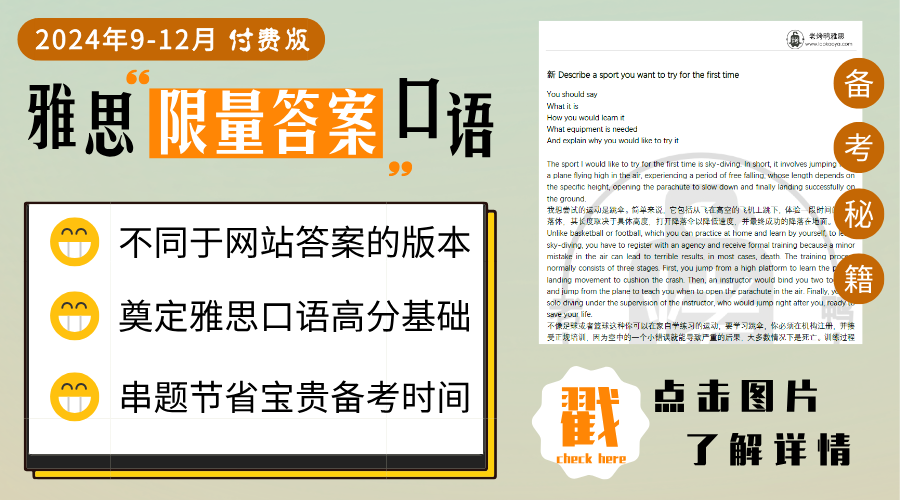剑桥雅思4 test 2 Section 3听力原文与答案 Details of assignment
这篇Section 3的主题为三名学生讨论某项调查研究的作业,算是正常考试中第三部分比较常见的场景。题型方面,该部分由8道填空和1道多选构成,这种搭配现在还是比较少见的。而且如果大家在真正考试的Section 3遇到了大量的填空,Section 4几乎一定会出选择来进行弥补,难度反而要更大一些。除此之外,这部分最大的难点莫过于其中一人吐字不清,语速又超快,很容易莫名其妙漏掉题目。
点击查看这篇雅思听力对应的答案解析与大家需要掌握的词汇:
雅思备考听力篇 剑4 test 2 section 3 雅思听力高频词汇
剑4 test 2 Section 3雅思听力原文
ROSA: Oh, there you are, good. Sorry, I’m a bit late – there was a long queue. So, have you worked out how to deal with this assignment then?
MICK: Not yet, we’ve only been here a couple of minutes ourselves.
ROSA: Can you just remind me what the task is exactly?
PETE: Well, there are two, no, three, parts to it: first, we’ve got to write an essay about ways of collecting data. Then…
ROSA: What’s the title of the essay exactly?
MICK: I’ve got it here: Assess the two main methods of collecting data in social science research’. Q21
ROSA: And how much do we need to write?
MICK: Fifteen hundred words. That’s for the essay. Then, for the second part of the assignment, we have to choose one method of data collection, and ‘carry out a small-scale study, making appropriate use of the method chosen to gather data from at least five subjects’. Q22 Q23
ROSA: And then we have to write a report on the study?
PETE: That’s right, of three to four thousand words. Q24
ROSA: Did you get as far as discussing which form of data collection we should go for -questionnaire or interview, isn’t it?
MICK: Yeah, I think we should use a questionnaire. It’ll be so much less time-consuming than organizing interviews, I reckon. Once we’ve agreed on the wording of it, we only have to send it out and wait for the responses.
ROSA: Yes, I think it probably would be quicker. But what did that article he gave us last week say about the quality of data from questionnaires?
MICK: I’m pretty sure it recommended questionnaires as a source of ‘highly reliable data’. As long as you design the questionnaire properly in the first place, the data will be fine.
ROSA: No, I’m sure it talked about drawbacks as well, didn’t it? Something about the response rate and the problems you get if it’s too low. Q25
MCK: Yeah, but we only need data from five subjects anyway.
ROSA: I suppose SO. Another drawback I remember it mentioned was that questionnaire data tends not to reveal anything unexpected, because it is limited to the questions fixed in advance by the researcher. Q26
MICK: Come on, Rosa. This is only a practice. It’s not meant to be real research, is it?
ROSA: Well, I’m not sure about that.
ROSA: Maybe I’d better go through the article again, just to be sure. Can you remember what it was called?
MICK: ‘Sample Surveys in Social Science Research’, I think. By Mehta. Q27
ROSA: M-E-H-T-A ?
MICK: Yeah. And he also recommended a more recent book, called ‘Survey Research’, by Bell, I think. It’s in that series published by London University. Q28 Q29
PETE: And if we tried to use interviews instead, I saw a book in the departmental library that’ll be helpful: it’s called ‘Interviews That Work’, by Wilson, published in Oxford in nineteen eighty-eight. Q30
ROSA: Right. I’ve got a tutorial now. Can we meet up again later this week? What about Friday morning?
PETE: Suits me. Eleven o’clock?
ROSA: Fine.
MICK: Before Friday, I think we should all look through the reading list.
剑4 test 2 Section 3雅思听力答案
21. collecting data
22. 1500
23. 5
24. 3000-4000
25-26. BC
27. Mehta
28. Survey Research
29. London University
30. 1988



这篇吐字不清
2022-07-27 19:52确实,说的超级不清楚
2022-07-28 16:23